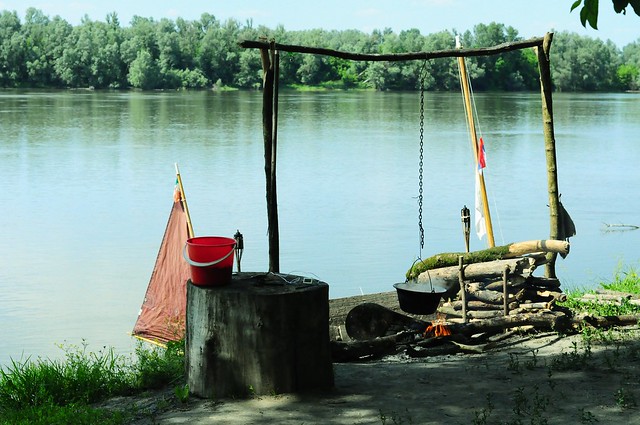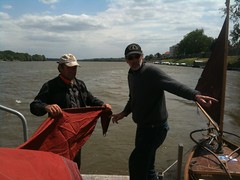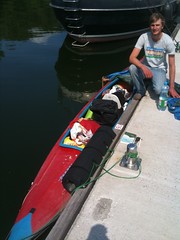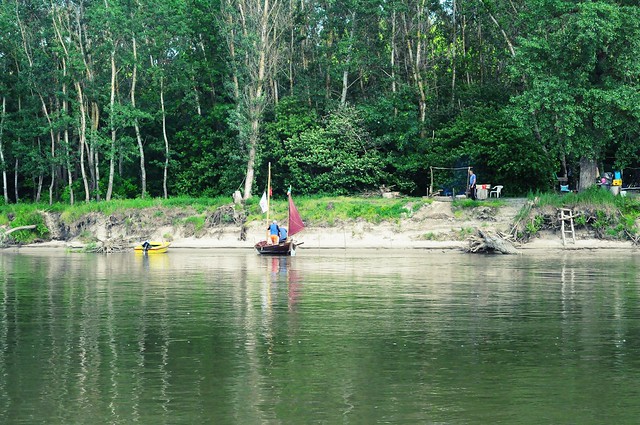
Knowledge is not only in our brain but also in our hands and, maybe, in our heart.
A big hug to everyone who’s now suffering in Emilia: It’s not much, I know, but that’s all I can do by now. I’ve felt the heartquake on the 29th of May. I was in Venice for my unfortunately still necessary medical exams, along with Jürgen Hoh who’s helped us in Bamberg.
Italy is sinking. I wish that it could resurface free from the too many sheds that waste its land (and that have been the first one to fall). I’m losing my will to tell, thinking to these things happening in one of the luckiest countries of the world, and richest too, in everything. I don’t know if I want to live anymore in such a stupid, crazy country.
 I was watching some documentaries on the 1991 war in the former Yugoslavia. Craziness there too. In these last few days I had the chance to talk about the war and much more with one of the nicest, most generous and rich people that I’ve ever met.
I was watching some documentaries on the 1991 war in the former Yugoslavia. Craziness there too. In these last few days I had the chance to talk about the war and much more with one of the nicest, most generous and rich people that I’ve ever met.
I meet Vlada in a morning of May, in Apatin. I’m busily discussing with Nicola about how to keep going along the river: I’m tired and upset.
I turn back and see this young man, tall and smiling, in a sportswear. He’s 34 and lives in Novi Sad, Serbia. Sometimes ago he’s traveled along the Danube all the way down to the Black Sea aboard his boat. He tells me many stories and give me a world, his world.

It was May 17th when I’ve left Bela and his gifts in Mohacs. Bela’s photos are in the flickr gallery: Please take a look since it’s full of beautiful images from Anna and Leon (and not so nice ones from me) that tell you about our journey way better than my words.
 Before entering Serbia we have to fill some exit documents. Why? I don’t know. Unfortunately we have to sail the Danube upstream for 2km, against a strong current of 10 km/h and an even stronger wind with 60 km/h gusts. Despite Bela’s pledges, the Hungarian police wants us there.
Before entering Serbia we have to fill some exit documents. Why? I don’t know. Unfortunately we have to sail the Danube upstream for 2km, against a strong current of 10 km/h and an even stronger wind with 60 km/h gusts. Despite Bela’s pledges, the Hungarian police wants us there.
On our guide we had a wrong indication and we passed by the offices, which is a huge mistake when you’re on the Danube. Thanksfully they allow us to get back aboard Serena, leaving Clodia downstream (I would never have make with her).
 We still don’t understand why we have to fill EU exit forms but we adapt to it. Six offices, half an hour, lots of courtesy and professionalism from the officers. We get back to Bela and I also receive a nice jib (a triangular sail for the foremast).
We still don’t understand why we have to fill EU exit forms but we adapt to it. Six offices, half an hour, lots of courtesy and professionalism from the officers. We get back to Bela and I also receive a nice jib (a triangular sail for the foremast).
We leave under a partly cloudy sky. I sail at 15 km/h with the only mizzen raised, the wind is quite strong. I can see the water steaming.
Then the wind calms down and I can raise the mainsail too, with three reefs: We fly! Maximum speed 18 km/h corresponding to nearly 10 knots, not bad. In three hours we reach Beszdan at the Serbian border. As you know, I’m not a fan of borders.
We stop to a floating pontoon, climb a steep ladder and enter the uncanny world of Serbian bureaucracy, following a local sailor. The building has unmistakably been built in the Iron Curtain age, still is very nice and polished, especially the huge garden surrounding it. Silent corridors.
A young officer look at us with a glacial expression: “passport!” Then takes our documents. A Captain makes his appearance: He wears more friendly uniform then the dark and light blue of the police. His face is nice, with moustaches remembering those of Stalin, just a little smaller. We get into his office: Very big, two screens and a TV set on the news. Cirillic and nice navigation maps.

Leon is nervous, Anna not as much. Captain Karadzic speaks a good English. He’s a nice man who carries a long and painstaking job. Every boat ask much of his time and the printer doesn’t always work. Boat measurements and a thousand words, in cirillic, to be written. At least six copies per person. We’re four people, three on Serena and one aboard Clodia. Such a waste of paper! Then we have to pay 58 euros for each boat, for 30 days of mavigation regardless from the kind of boat. But we don’t have any money.
 The Captain is a bit upset but he doesn’t give up: I can feel that he’s one of our angels. He takes Anna with him, bringing her to Beszdan, 5 km away, where there’s an ATM. Anna withdraws the money we need and, an hour later, we’re officially in Serbia.
The Captain is a bit upset but he doesn’t give up: I can feel that he’s one of our angels. He takes Anna with him, bringing her to Beszdan, 5 km away, where there’s an ATM. Anna withdraws the money we need and, an hour later, we’re officially in Serbia.
To cheer up, our Captain Karadzic offers us three sljivovica: I have to drink two of them since Leon doesn’t drink any alcohol.
The Captain is on duty so he can’t drink too. I’ve definitely entered Serbia. The police comes to inspect the boats. Angela is a very likeable policewoman, nice face and eyes that must have seen a lot: She immediately understand us and we start a communication that knocks down those absurd borders, those senseless papers. I watch the birds in the sky: They don’t know this is called Serbia, but fly quite as well.

To me, this country seemed beautiful at once, and even more so its people. The Danube is kept very natural, apart for some wall inheritance of the former regime. Surely, the sljivovica helps my judgement, as it does a wonderful sunset.
A gentle wind in two hours takes me to Apatin, where the orthodox meringue is illuminated by the eastern sky. I leave the sail with three reefs, despite a weak wind, and I let Clodia go regardless of sail regulation. I wish it could always be this way.
 Dejan is waiting for us: He’s a tall Viking, arrived here a thousand years ago, welcoming me in the Serbia’s nicest marina. We have a wonderful, incredibly cheap dinner in a very near restaurant (open 24 hours a day!), as a great end for this day.
Dejan is waiting for us: He’s a tall Viking, arrived here a thousand years ago, welcoming me in the Serbia’s nicest marina. We have a wonderful, incredibly cheap dinner in a very near restaurant (open 24 hours a day!), as a great end for this day.
To bad for bureaucracy and all the money needed to maintain it, but we have learned to wait and understand with patience: In exchange, we’ve been understood and helped. We have a good balkan sleep: The next morning a music blast, from the near gas station, wakes us up. We have breakfast and quite soon Vlada comes to visit.
 In the city we meet Captain Karadzic, what a coincidence! He offers us a Turkish coffee and insists to pay for it, despite having already helped us the day before. We have an interview with a local TV channel, then we get back to the marina where Dejan has granted free mooring to Clodia (and just 3,5 euro for Serena). I notice a boy with a Nordic look, crouched against a curbstone, holding a booklet with written “DONAU”.
In the city we meet Captain Karadzic, what a coincidence! He offers us a Turkish coffee and insists to pay for it, despite having already helped us the day before. We have an interview with a local TV channel, then we get back to the marina where Dejan has granted free mooring to Clodia (and just 3,5 euro for Serena). I notice a boy with a Nordic look, crouched against a curbstone, holding a booklet with written “DONAU”.
I feel that he’s a Man of the River too, and I’m right… His name’s Jacob and his travel mate is in jail. They have crossed the border aboard a sailing kayak without stopping and have been caught in Apatin. Paul gets freed, but they have to pay a 500 euro fine and live the contry within 10 days.
We set off late, with Vlada’s boat towed by Serena and Vlada aboard Clodia with me. After a few km we spot a guy waving his arms, a boat, a nice beach under a steep bank, a big pot over a campfire. Vlada and the man have a nice chat and we get invited for a drink.

Batan is 51 years old, and he’s one of the Danube (Duna here) wolves. He lives here for seven months a year, in a camp that he’s built himself and nothing very important is missing, in total respect for nature. A nice person, anarchical, with many fishing rods and social eremite tricks.
 Cigarettes, sljivovica and coffee come from passerbies, for all the rest he relies on the big river and Mother Nature. We’re happy and Leon draws him a nice portrait that’s immediately sticked to the fridge. Great Batan.
Cigarettes, sljivovica and coffee come from passerbies, for all the rest he relies on the big river and Mother Nature. We’re happy and Leon draws him a nice portrait that’s immediately sticked to the fridge. Great Batan.
We’re still between Croatia, right side and many mined beaches, and Serbia, left side and mine free.
I’m sorry, we can’t land in Croatia by now.
More news coming soon.
Giacomo























